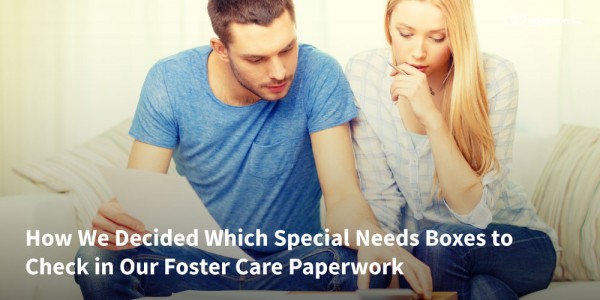There is a mountain of paperwork to be completed for adoption and foster care. I don’t even remember half of the forms we filled out that compiled the giant folder that is our foster parent file. There is one that I do remember having a difficult time completing, and that was the one where we had to rate how comfortable with or willing we were to deal with certain special needs.
“Special needs” in foster care and adoption is an umbrella term used to refer to all of the things that aren’t considered “normal” in childhood behavior or development. This could mean a speech delay, violent outbursts, reactive attachment disorder, ADHD, developmental delays, trauma history, severe medical condition, or even just being a part of a sibling group.
This form was difficult to complete because it made me think of all the children I might be saying “no” to if I checked that I was unwilling to deal with a certain “special need.” But, at the end of the day, we had to make those decisions and decide which special needs boxes to check.
Here are the best tips I can give to anyone facing this paperwork:
Consider Your Strengths
Think about your personality, experiences, job, and relationships. How have those things specially equipped you in certain areas? If you have a medical background, or have a family member with medical issues, you may be equipped take on a child with medical issues. If your job allows you a flexible schedule, you may be able to take in a child who needs to go to several appointments each week, or needs extra support to build attachment. Look around at your support system; do you have special support that may equip you to handle more than one child?
Be Realistic
Do your best to understand what each category of special need might entail and be realistic about whether or not you, your job, or your family can provide it. Again, consider your support system, your job schedule, your personality. A certain category of special need may call for flexibility to see many specialists, or the ability to structure the day around medication or behaviors, or the emotional ability to distance yourself from certain behaviors. Many things can be adjusted and learned, but some things cannot. Figure out what those things are and how they affect what boxes you can check.
Be Brave
Above all, be brave. Stretch yourself; you can handle more than you think. “Special needs” can sound scary to deal with, but these children aren’t just labels and diagnoses—they are kids who desperately need love and support. There are no guarantees in any kind of parenting, but in adoption and foster care these children have the unfortunate reality of being judged by their “special needs” first, instead of their heartbeat or smile or cry.
The reality is that children with special needs are far less likely to get adopted than those considered “healthy” or “normal.” If you are considering fostering or adopting a child with special needs, you are already saying “yes” when so many others have said “no.” Checking just one special needs box will open up the possibility for one child or sibling group to experience the love and support of a forever family, when they otherwise might not have had the chance.

